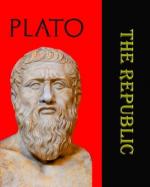|
|
The Republic Notes & Analysis
The free The Republic notes include comprehensive information and analysis to help you understand the book. These free notes consist of about 79 pages (23,461 words) and contain the following sections:
These free notes also contain Quotes and Themes & Topics on The Republic by Plato.
The Republic Plot Summary
Socrates meets with some of his friends and other people. He begins discussing the meaning of justice and whether the just life is better than the unjust life. They first contemplate the meaning of justice, with Cephalus stating that justice is as simple as telling the truth and returning what you receive, Polemarchus stating that justice is giving each his due, and Thrasymachus stating that justice is the advantage of the stronger. Socrates proves each of them wrong and embarks on a discussion to find out what true justice is, and to find out whether the just man is truly happier than the unjust man, or vice versa.
They discuss and establish that justice is in the class of things that ought to be practiced for their own good, as well as for the good of their consequences. However, it could be argued that people are only just because they are afraid of the punishments of injustice. In order to clarify what justice is and what the good life truly consists of, Socrates says that they should look at it on a large scale, using a city as an example, and then examine it on an individual basis. In the city, people will have their basic needs; everything will be shared; there will be a rigid system of educating and bringing up people; and the best of these people, the guardians, will be chosen to guard and rule the city. Also, imitation won't be allowed, and the gods may only be depicted as beautiful, gracious, the originators only of good, never evil.
Then they find that there are four excellences in the city: wisdom, courage, temperance, and justice. If they follow their original example in which the city substitutes for the person, these four excellences must also exist in a person, in the soul. Since they all exist in the soul and can often contradict, it is established that the soul is made up of parts and is not a whole. Also, just as in the city it is assumed that the rational people should rule, it is assumed that in the soul the rational part should rule. Thus justice is "establishing the parts of the soul so that they dominate and are dominated by each other according to nature, injustice so that they rule and are ruled contrary to nature." Book 4, pg. 112, line 444d
Socrates then goes on to state that nobody will be happy until either philosophers become kings, or kings become philosophers. He proves this through much thought and questioning, showing that it is only philosophers that truly love wisdom and are out to seek the truth and accept it. To demonstrate the difficulty of accepting the truth, Socrates tells the story of the cave, where men see only shadows in the dark and assume them to be the truth. When they actually see that the truth is different from what they are used to, they refuse to believe it at first, although they do later.
After this, Socrates goes on to show that there are four types of regimes, listed in the order of most just to least just: aristocracy, timocracy, oligarchy, democracy and tyranny. Then he goes on to say how each develops from the other, and why each is just and/or unjust. Similarly, the men from each era represent the amount of justice in their souls. This in turn proves that the just man is happier than the unjust man.
After all this, Socrates goes on to the story of Er, a story about a man returning from the afterlife and describing it. At the end of the story, he says that because he and his companions have established that the soul is immortal, and because this story speaks about the immortality of the soul, it is even more important for people to be just and seek good and true knowledge in their life. This, in turn, will bring them much happiness in both this life and the afterlife.




